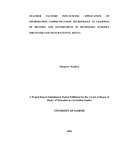| dc.description.abstract | Over the last few decades, Information ICT has become increasingly important in all organisations in modern societies including schools (World Bank, 2014). Expectation about ICT and its role in developing and transforming the educational process through its inclusion in the daily school environment is increasing in many developed and developing countries. The study aimed at investigating teacher factors influencing the application of ICT in teaching and learning of history and government in public secondary schools in Bungoma South Sub-County, Bungoma County, Kenya. The specific objectives includes, to establish the extent to which teachers’ level of education, teachers’ training in ICT, teachers attitude towards ICT and teachers experience in teaching using ICT influences application of ICT in learning of history and government in secondary schools in Bungoma South Sub-County. This study adopted a descriptive methodology design where by quantitative tools were used to collect data. The population comprised of the 51 public secondary schools in Bungoma South Sub-County, 51 principals, 112 teachers of history and government, 1100 students of history and government and 20 teachers of computer studies. A random sample of 120 form three students of history and government, 24 teachers of history and government, 12 principals and 12 teachers of computer studies were interviewed using a semi-structured questionnaire and interview guide. Questionnaires were used to collect data from teachers and head teachers, Qualitative data was analyzed using descriptive statistics as well as inferential statistics which included Chi Square. The findings from different data sets were synchronised during the presentation and discussion.From the foregoing, the results indicate that the level of education and training in ICT determined the extent to which the teachers used ICT in learning of history and government. The teachers with masters level of education were utilising ICT in learning of history and government much more compared to their counterparts without. The training in ICT software also played an important role with Microsoft word being used by the highest number, followed by spreadsheets, internet then Email. The most commonly used ICT tools were desktop computers and mobile phones. The study revealed that student–oriented pedagogical approach, teachers positive attitude towards computers, computer teaching experience, and personal entrepreneurship of the teacher educator have a direct positive influence on the innovative use of ICT by the teacher. The accessibility to ICT tools is crucial since their availability enable teachers to utilise them. The results provide additional information in formulating policies which will enhance the application of ICT in learning of History and Government | en_US |



